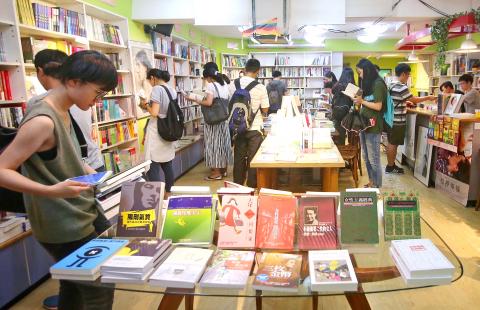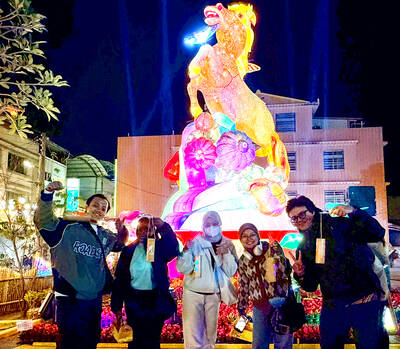Fembooks, a feminist bookstore which has been in business for 30 years, announced on June 1 that its physical store will close next month due to long-term losses.
Despite the support of more than 600 Fembooks account members, the bookstore was unable to shoulder monthly losses of between NT$50,000 and NT$70,000. Fembooks store manager Yang Ying-ying says it was decided at a shareholder meeting on May 21 that it was necessary to halt the company’s losses and “restructure debt.” Yang says “a new manager will be elected at July’s shareholder meeting” and “there is hope of the possibility that the store can reopen for business.”
This is not a “full-stop,” says Yang, simply a “comma.”

Photo: CNA
照片:中央社
Fembooks will continue to publish, and its online bookstore, Facebook page and blog will continue to operate as normal, although the bricks-and-mortar shop be now used as part of its publishing operation. However, as before, readers will still be able to pop in and choose a book.
Fembooks was established in 1994. At the time, National Taiwan University associate professor of sociology, Fan Yun, was still a student. Fan describes the bookshop’s presence on the scene as an oasis of enlightenment for the feminist movement and gender equality, and said the store’s temporary closure fills her with “regret and sadness.” Fan added, “Fembooks contributed greatly toward Taiwan becoming the first country in Asia to recognize marriage equality and progress toward gender equality.”
“Although we’ve hit rock bottom,” says Yang, “I’m confident that if a member of the younger generation comes forward with creative, fresh business ideas, Fembooks will be able to carry on in a new guise.”
(Liberty Times, translated by Edward Jones)
開業廿三年的女性主義書店女書店,不堪長期虧損,六月一日宣告將於七月一日起結束門市營運。
雖然有六百多個女書之友情義相挺,仍挺不過每個月五到七萬元的虧損,女書店店長楊瑛瑛說,書店按照股東們在五月二十一日會議上所做的決定,設下停損點,「先進行債務重整。七月股東會選出新的經營者,期待能有一個重新開始的可能性。」這不是「句點」,只是暫時畫一個「逗點」。
女書的網路書店、臉書、部落格及出版,都不會停止。門市停止營運之後,店址保留,功能轉變為「出版社」性質,讀者依舊可以到這裡選書。
女書店於一九九四年創立,台大社會系副教授范雲當時仍是台大學生,她形容,女書店的出現,對於女性運動及性別平權的啟蒙猶如荒漠甘泉,對門市將暫時熄燈,她表示既「遺憾、難過也感嘆。」范雲說:「台灣成為亞洲第一個婚姻平權的國家,在性別平等上的成就,女書店也貢獻不少力量。」
楊瑛瑛說:「到谷底了,我相信若有年輕世代帶進新的創意與行銷概念,將來或許可以全新的面貌再出發。」
(自由時報記者凌美雪)

A: Harvard professor Robert Waldinger’s “7-day Happiness Challenge” includes: Day 1: Take stock of your relationships; Day 2: The secret power of an 8-minute phone call; Day 3: Small talk with strangers has big benefits. B: That’s not too hard. What’s next? A: Day 4: Why you should write a “living eulogy;” Day 5: The importance of making work friends; Day 6: Don’t cancel those social plans. B: Good ideas. What’s the final challenge? A: Day 7: Keep happiness going all year long. So, I’m inviting some friends to the Taipei Lantern Festival today to build good relationships. Wanna

★ 本文由生成式 AI 協作,本刊編輯編修。 For tourists looking for a scenic way to spend an afternoon in Kaohsiung, heading to the British Consular Residence of Takao is the perfect choice. Its elevated position allows one to take in the bustling Kaohsiung Harbor to the east and the dazzling sunset over Sizihwan Bay to the west. This elegant red-brick building also serves as a portal to the city’s rich history. Interestingly, for 70 years, many people mistakenly identified this residence as the actual consulate. The history of “Takao,” the former name of Kaohsiung, began its international chapter in the mid-19th century. As European powers

★ Bilingual Story is a fictionalized account. 雙語故事部分內容純屬虛構。 The fog came before the knock. It covered the street and pressed against the window. Chao Gung-dao lit a small oil lamp, but his makeshift hut stayed dim. Another knock. Chao opened the door. The inspector stepped inside and removed his hat. He did not smile. “You remember me?” the inspector said. Chao resented the question. The inspector looked around the small room. His eyes stopped on a wooden box resting on a low beam above Chao’s head. “What is that?” Chao stayed silent. The inspector pulled the box down and

★ 本文由生成式 AI 協作,本刊編輯編修。 Continued from yesterday(延續自昨日) https://www.taipeitimes.com/News/lang Kaohsiung’s deep connection with the sea continues to thrive, with Kaohsiung Harbor remaining a crucial hub for global shipping. In addition to the port, the city has emerged as a major player in another world-class maritime industry—yacht manufacturing, responsible for producing 80 percent of all Taiwan-made yachts. The yacht industry in Taiwan originated in the post-World War II era, when the US military presence in Taiwan provided local boat builders with guidance on making wooden yachts. The resulting craftsmanship was so exquisite that orders soon poured in. In 1977, Taiwan replaced Canada as the main yacht